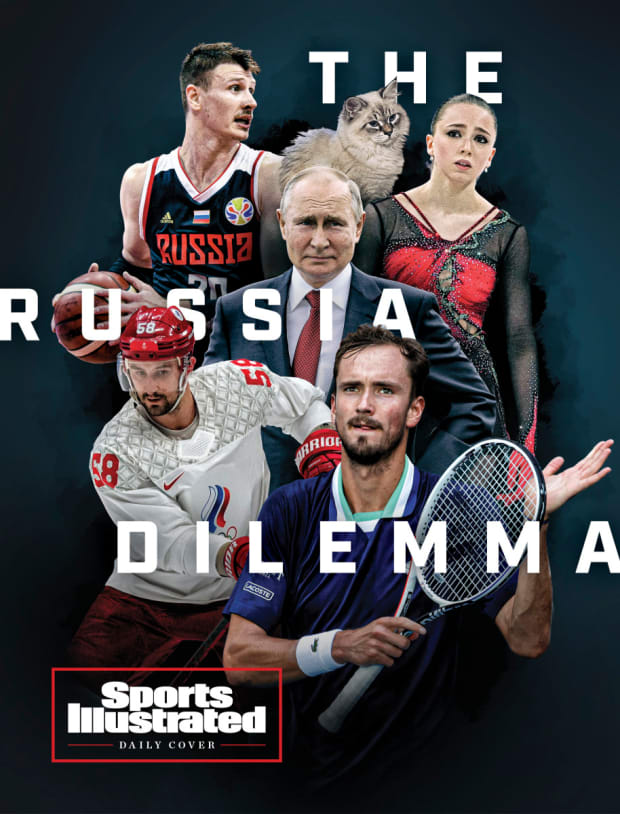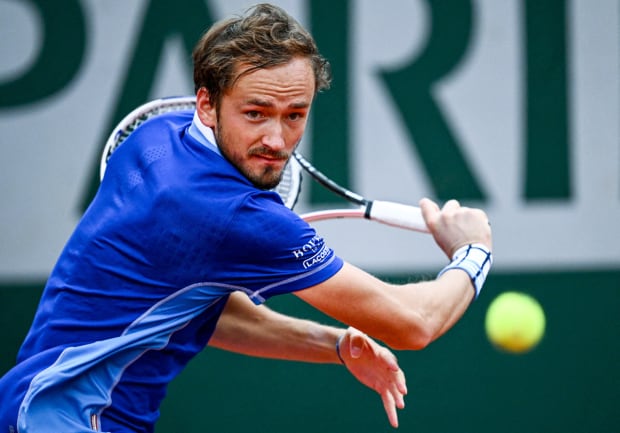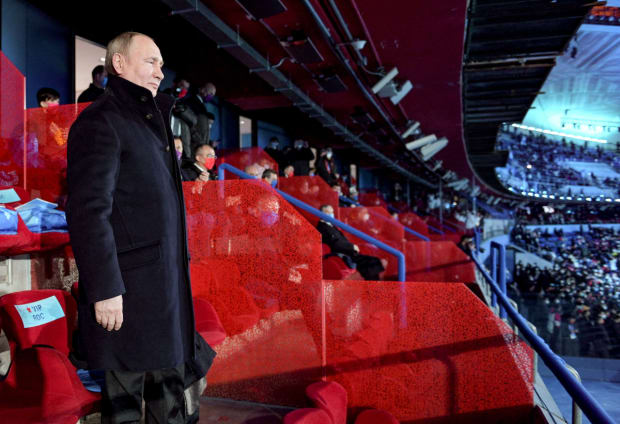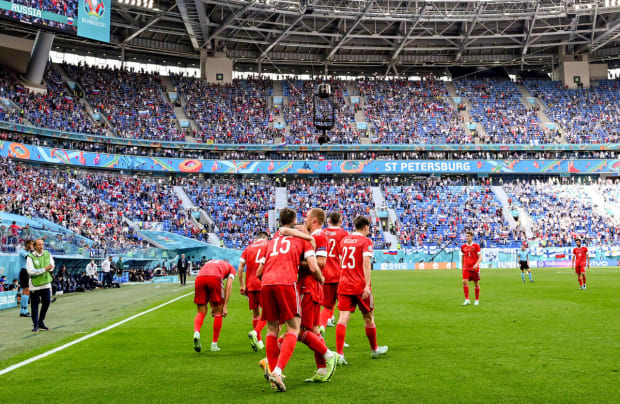Everywhere you look in sports these days, Russians are disappearing. The international governing bodies for basketball, soccer and hockey—FIBA, FIFA and the IIHF—banned Russian teams from competition in the wake of Vladimir Putin’s invasion of Ukraine. Wimbledon has boxed out Russian players. Even the International Cat Federation has forbidden any feline bred in Russia from entering international competition, citing Russia’s “unprecedented act of aggression.”
In our polarized modern discourse, complex topics tend to get chopped into two sides, and so the Russia issue in sports has been simplified: To ban or not to ban, that is the question.

Photo Illustration by Bryce Wood; Robert Deutsch/USA Today Sports (Valieva); Geoff Burke/USA Today Sports (Medvedev); George Walker IV/USA Today Sports (Slepyshev); VCG/VCG/Getty Images (Vorontsevich); Mikhail Svetlov/Getty Images (Putin)
But the question is not simple. It is not even one question. There are different kinds of sporting events and different stated reasons for the bans. There are varying political ramifications, marketing calculations and moral concerns.
Some of these decisions are easy and straightforward. Pulling a Formula One race out of Russia is an economic sanction in line with how the West has responded to the invasion of Ukraine. It is also a safety measure. Considering Russia’s ongoing detainment of U.S. basketball star Brittney Griner, no sports organization should risk sending athletes to Russia right now.
Other decisions are not so clear-cut. The Russia issue is the ultimate test of sports’ place in politics—and of politics’ place in sports. Can an athlete be from Russia but not for Russia? How much should government actions affect the playing field?
Ignoring the invasion of Ukraine entirely would be both insensitive and foolhardy. But the sports world is also in danger of punishing innocent athletes, boosting Russian support of Putin—and, inadvertently, adopting Putin’s twisted view of what sports should be.
Russia invaded Ukraine on Feb. 24. That timing is essential to understanding why banning Russian athletes became so widespread: It happened in the small window between the Winter Olympics and the Paralympics, which made the International Olympic Committee the leadoff hitter.
The IOC is the rare major sports organization that had already banned Russians, for a state-sponsored doping scandal uncovered after the 2014 Winter Games. The IOC later retreated, though, allowing Russians to compete, just not under their own flag. And the ’22 Winter Olympics in Beijing showed how punchless that half-measure really was: Russian figure skating star Kamila Valieva was allowed to compete despite testing positive for trimetazidine, a drug that was widely believed to have been administered to her without her knowledge.
So, before the invasion of Ukraine, Olympic and Paralympic athletes already had a justifiable anger toward Russians competing at all. That atmosphere made it easier for the IOC to defend keeping Russians out of the approaching Paralympics, the first domino that started a succession of bans.
But hold on. The IOC’s primary official reason for banning Russians—and Belarusians, whose government supports the invasion—was that other countries were threatening to boycott. The IOC also said in a statement that allowing Russians to compete would threaten “the integrity of these Games and the safety of all participants.” Basically: So many athletes from other countries were furious about the invasion that the IOC feared violent altercations.
However, not one of those reasons applies to Wimbledon—or, really, to most other sporting events. There is no indication that any tennis players would skip the tournament in London if Russians were to compete. (Top players, in fact, have spoken in favor of Russians competing.) But now, as a result of the ban, the men’s and women’s tennis tours have decided not to award rankings points for Wimbledon.
The All England Club, which runs Wimbledon, announced that the goal of its ban was to “limit Russia’s global influence through the strongest means possible.” This is, essentially, another version of the sanctions that the Western world has levied upon Russians: taking yachts from oligarchs and Wimbledon slots from tennis stars.

Anne-Christine Poujoulat/AFP/Getty Images
As Sports Illustrated’s Jon Wertheim has written: Boris Johnson, the prime minister of the United Kingdom, favored a ban, and the All England Club risked being at odds with its own government. That could have created a situation where Russian star Daniil Medvedev, the No. 2–ranked male in the world, was in line for a high seed but was denied entry to the U.K.
FIFA hit the same notes as the All England Club, announcing its ban “in full solidarity with all the people affected in Ukraine.” That aligns with most of the world’s reaction to the invasion. But the first organization to ban Russian athletes, the IOC, explicitly said in announcing its action that it is “united in its sense of fairness not to punish athletes for the decisions of their government if they are not actively participating in [those decisions].” Now organizations are saying the opposite: Russia should be ostracized in every possible way. While that’s a good political talking point, with widespread support, cutting off Russians in every possible way could bring unintended consequences.
It is helpful, for the purpose of evaluating these bans, to place prominent sporting events on a scale. On one end: events where athletes clearly represent their country. The Olympics. The Paralympics. The World Championships. On the other end: events where athletes either compete as individuals or for professional teams rather than countries.
The argument for banning Russians from the world-championship end of that scale is straightforward. Those teams exist to compete for Russia. Putin’s government has forfeited the right to enter any such competition.
U.S. Olympic Committee CEO Sarah Hirshland, who has pushed to sanction the Russians for doping, points out that the doping scandal and the invasion of Ukraine are “two separate topics with one common denominator.” But she believes both merit action: for the doping scandal “until … integrity and confidence has been restored,” and for the Ukraine invasion indefinitely. Hirshland says that the USOC defers to the IOC and other governing bodies “as they evaluate the appropriateness of allowing Russian athletes to compete in sanctioned events, and of Russia hosting future elite sport competition.”
The IOC’s ban does not have much historical precedent. The entire Olympics were canceled during World War II, and plenty of totalitarian states and countries at war have entered international competitions. In December 1979, for example, the Soviet Union invaded Afghanistan and poisoned then President Hafizullah Amin (he survived but was soon after assassinated), starting a nine-year civil war in Afghanistan. Still, the IOC allowed the U.S.S.R. to compete in the Lake Placid Winter Olympics two months later, and to host the next Summer Games, in Moscow. (The U.S. and its allies responded by boycotting the latter.) Iran, whose athletes have chosen in the past to forfeit rather than compete against Israelis, continues to send delegations.
Bruce Berglund, an expert on Russia at Gustavus Adolphus College, points out that international sporting sanctions have been an effective tool in at least one significant case: during South Africa’s apartheid era. But the events that led to world sporting organizations banning South African participation were different in one important way. South Africa’s government, as part of its doctrine of racial separatism, prohibited nonwhite athletes from competing within its borders against white athletes. Most famously, American tennis star Arthur Ashe repeatedly applied to compete in South Africa, and he was repeatedly denied the opportunity. Once this racist system was imposed on foreign athletes, a boycott was the only logical response.

Still, one can reasonably argue that, right now, Russia should be banned from competitions like the World Cup and the Olympics, because while, yes, individuals would be hurt, the idea is to punish the teams. And any Russian competing in a world championship is by definition competing for Russia.
Wimbledon is another matter. Medvedev, who was born and raised in Moscow, has spoken out against the war, calling the invasion of Ukraine “very upsetting.” He is being excluded exclusively because of his nationality, which falls pretty squarely under the definition of discrimination. Americans and Brits in favor of any blanket ban should ask themselves if they, too, would like to be held personally accountable for the actions of their own government.
Is every free throw an expression of support for President Biden? Did the U.S. women’s soccer team win the 2019 World Cup for then President Trump? And if Medvedev is paying a severe price for a larger cause, we should ask: Do the bans actually advance the cause? Or do they hurt it?
The argument that sports can have any influence at all on Russian foreign policy goes like this: Any Russian athletic success becomes propaganda for Putin, and any acceptance of Russia into mainstream society implies that Russia is in good standing amongst other nations.
Russian sporting success “plays into this delusion that Russians are able to maintain—at least if you just look at the sports news—that Russia still has a normal, respected place in the world,” Berglund says. “The Western idea that an individual is representing [only] themself and their club—this is not how Russians view their athletes performing internationally.” Putin has said that himself. In 2000 he proclaimed that “victories in sport do more to cement the nation than 100 political slogans.”
Berglund argues that Putin has used Russian athletic success for propaganda purposes so successfully that allowing Russian athletes to compete, and therefore possibly win, is to effectively allow Putin more propaganda. That is inarguable. But that’s not the whole story.
First, it is important to understand why Putin led Russia into Ukraine in the first place. In 2005 he referred to the collapse of the Soviet Union as “the greatest geopolitical catastrophe of the [20th] century.” Americans are taught to associate that collapse with the decline of communism, and so it is easy to assume that Putin was being sentimental about communism. But he wasn’t. He isn’t a communist. He laments the collapse of the Soviet Union because in the fallout several Soviet socialist republics, including Ukraine, became independent from the mother country, the Eastern bloc fell apart, and the net result was the diminishing of the surviving Russia’s standing relative to its peers.
Matthew Schmidt, who directs the University of New Haven’s program in international affairs, says that Putin’s motivations in Ukraine are built on the concept of Eurasianism, which posits that Russia is a civilization with widespread power. That is the driving principle behind Putin’s foreign policy. That, to put it far too simply, is why he is so furious that Finland might join the North Atlantic Treaty Organization. Finland is not a physical threat to Russia—nobody thinks the Finns are going to try to seize Saint Petersburg—but a stronger NATO implicitly means that Russia is weaker.

Alexei Druzhinin/Sputnik/AFP/Getty Images
If you boiled Putin’s propaganda down to two simple objectives, they would be to promulgate: a) the idea of Russian supremacy and b) the conviction that the West does not want Russia to succeed. If Medvedev wins Wimbledon, then yes, Putin can use that to promote the notion of a mighty Russia. But if all Russians are banned from Wimbledon? He can use that even more effectively, to show his people that the West is anti-Russia.
“Preventing Russian athletes from performing isn’t going to change his policy in Ukraine,” says Schmidt. “It’s going to make him angry. It’s going to play into this preexisting philosophy that he has of manifest destiny being thwarted by the West. In a pure power-politics sense, banning is more useful for him than winning. The fact that a Russian wins Wimbledon doesn’t make Russians more likely to support the war in Ukraine. But banning them may.”
In the far-too-long history of Olympic doping scandals, Kamila Valieva’s case might be the saddest. The Russian figure skater was 15 when she tested positive. It seems clear that the adults around her failed her. But in the wake of state-sponsored doping at previous Olympics, it was not surprising. Russia has been willing to sacrifice the welfare of individuals for the cause of national sporting success. Schmidt says: “Doping your athletes is an athletic version of hardcore politics—of saying Values don’t matter.”
But values should matter. Putin views athletes as tools of the state whose main purpose is to win, bringing glory to their country. The West traditionally views athletes as individuals; we believe that sports and those who compete in them have value that goes beyond results.
So when Hall of Fame goalie Dominik Hasek tweeted that “the NHL must immediately suspend contracts for all Russian players!” he was—whether or not he realized it—agreeing with Putin philosophically. He was saying that any Russian is just an extension of Putin. (In practice, Hasek’s idea is far-fetched. As union members, NHL players are covered by a collective bargaining agreement, and firing people simply for being Russian would open up the NHL to lawsuits.)
Berglund, for his part, agrees with Hasek. He cites an “extreme case … the largest war in Europe since World War II” and says that “most of the world is allied economically and politically against Russia; and to say that we should allow Russian athletes to continue to participate … goes against what we’re seeing happening in the world.”
Does it, though? Sure, corporations like Starbucks and McDonald’s are pulling business out of Russia. But Russian nationals working in the U.S. are still free to keep doing their jobs. Why should it be different for athletes?
In practice, a blanket ban of Russians from sporting events would cause more problems than it would solve.
What if a Russian athlete denounces Putin, at great risk to their own safety? Are they still banned?
What if a non-Russian athlete comes out in support of the invasion? Do they then get banned?

Kirill Kudryavtsev/Pool/AFP/Getty Images
What if an American athlete is discovered to have a loose affiliation with a white supremacist group? What if the affiliation is so loose that it comes down to a single Instagram like?
Berglund pushes back: “You’re concerned about a slippery slope, moving more in a rigid direction, where we’re going to set up more and more rules and exclude more and more people,” he says. “My concern is the slippery slope falls basically into nihilism, where we say: No, it’s all open; there are no norms, no boundaries, no considerations whatsoever.”
What Berglund sees as nihilism, one can also call neutrality. Perhaps the best thing about sports is that they bring individuals of varying backgrounds, ethnicities and political beliefs together. They show us what we have in common with one another. It would be awful if we used sports to show what we have in common with Vladimir Putin.







